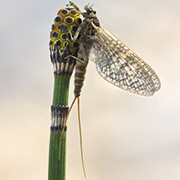Ľubica Čekovská has written a large-scale symphonic work for the Essen Philharmonic, an extremely multi-faceted piece of music. The title Palingenia is the scientific name for the mayfly.
[t]akte: Why did you choose the title “Palingenia”?
Ľubica Čekovská: Above all, I regard it as a great honour and privilege to be able to compose a commission for this renowned orchestra! Straight away I had the idea, inspired by spring-like impressions of nature from our garden, of writing a piece of music on this fascinating insect – fascinating also in the existential sense – with its very short life and its evocative-sounding Latin name. My piece is in three parts, it describes the awakening, the life and – in the form of a lament – the perpetual sleep. The beautiful dance of life ends with this creature and his fellow creatures which appear in swarms as with a huge flower. The numerous dead insect bodies form white patches carried along on the river. Fishers nowadays call this peculiar phenomenon “Dunavirag” in Hungarian: flower of the Danube. All of this stands symbolically for the wonder of life and passing away. It touches me so deeply that it has taken shape in this symphonic work.
Do you believe in inspiration? What sparks your compositional creativity?
Absolutely! It could be that I’m quite an “old-fashioned” composer in this, but I firmly believe in being able to draw inspiration in the literal sense of the word from almost everywhere. Out of this, something fundamental develops for me as a composer: I feel free to formulate my own musical language. A language in whose rules I firmly believe.
You’re also busy as a pianist. Do you often use musical ideas which have emerged whilst you’re improvising? Do you write at the piano?
That’s right, I’m a pianist and I improvise a lot, however I haven’t used the piano for composing for a long time. This strengthens my powers of imagination and spurs me on to the maximum imagining of sound. As well as that there’s quite a practical reason: I don’t want to disturb my two small sons whilst they’re playing.
The discrepancy between the laborious, slow business of notating music and the fast real time of a performance has often been the subject of discussion. Another aspect of timing is required for writing for the operatic stage. With your “Dorian Gray” you’ve written a dramatic novella after Oscar Wilde. Does the genre of comedy attract you?
I was very happy when I received the commission for my first full-length opera from the Slovak National Theatre in Bratislava. The 130 minutes of my Dorian Gray have shown me that music composed in months and the real time during the performance have come together wonderfully. This invaluable experience strengthens my resolve to write more for the stage, and what’s more, a really nice project is beginning to emerge: a juicy theatrical subject matter! The comic genre is unbelievably difficult, but also highly attractive! It will place particularly high demands on my music and on me. I’m now in the starting blocks and can hardly wait!
Interview by Michael Töpel
(from: [t]akte 2 / 2015)



